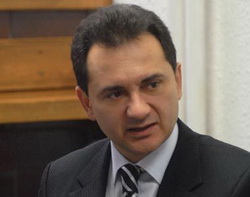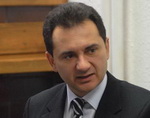Q:
A:
No concessions over Kosovo for sake of EU membership
Belgrade,
16 October 2009
Deputy Prime Minister for EU integration Bozidar Djelic stated in an interview for today’s edition of the Danas daily that Serbia will never agree to any concessions regarding Kosovo for the sake of EU membership.
The Serbian government’s official web site gives excerpts of this interview.
About the European Commission’s new annual report on Serbia’s progress in EU integration:
The report is positive for Serbia and as such it has entered the Enlargement Strategy, which is a synthesis of reports for every country individually. Out of 24 categories progress has been noted in as many as 22 and we can say that technically, the report is a sufficient basis for acquiring candidate status. Naturally, the formal acquisition of this status implies the completion of cooperation with the Hague tribunal.
Another positive aspect is that the European Commission has for the first time officially and unanimously endorsed the implementation of the Transitional Trade Agreement. We can expect that it will be discussed at the next meeting of the EU Council of Ministers later in the month. For the first time the implementation of the transitional agreement has been officially accepted as the track record, that is, the proof of Serbia’s capacity to implement the agreement.
About the stance of the European Commission head in Belgrade that Serbia should work more on law enforcement and have a more pragmatic approach towards Kosovo:
As for law enforcement, it is important to move from quantity to quality, that is, to stop adopting laws under emergency procedure and ensure enough time for debate in parliament. On the other hand, we should try to avoid falling into another trap – to have good laws that are not enforced. Bearing in mind that five EU countries have not recognised Kosovo, everything regarding this issue must be status neutral and in line with Resolution 1244. The EU does not interfere in status issues, it cannot demand that we directly or indirectly recognise Kosovo, nor would we ever agree to that. The emphasis is on finding more pragmatic solutions for maintaining regional forums and for the functioning of the CEFTA agreement, and in these cases Serbia and the European Commission have come up with different solutions. Belgrade is not trying to isolate Kosovo from regional forums, but is simply asking that everything is in accordance with Resolution 1244. As for CEFTA, the agreement was signed with a representative of UNMIK/Kosovo, but the name of the participant can be altered only through the consensus of all signatories, which means we have strong arguments for our stance here.
Is Kosovo going to be the last issue to be resolved between Serbia and the EU?
Serbia will never agree to concessions over Kosovo for the sake of EU membership. It is beyond doubt that, by signing the police agreement with EULEX, we demonstrated our wish to solve the issues of the people living there. Serbia has contributed a good deal to stability in Kosovo-Metohija. Europe wants economic and social perspective in the province and we agree with that. I must point out that, despite all claims, the European Commission has not composed a feasibility study for Kosovo, which is another proof that Brussels is not treating Kosovo as a state.
About the European Commission’s proposal to unfreeze SAA:
The Commission adopted the report unanimously. We know that the decision will be made at the Council of Ministers and that is where the consensus should be established. We are trying to ensure that the Council contemplates the report and the Commission’s concrete proposals. It will be most favourable if this takes place at the October meeting of the Council of Ministers, or in December at the EU Summit. The Council may welcome the Commission’s proposals, thus signalling its political support, and the most favourable outcome for Serbia would be the decision to start implementing the Stabilisation and Association Agreement (SAA). Afterwards, applying for candidacy would be a mere formality.
In what way could consensus within the EU be reached when it comes to unfreezing the SAA?
Serbia’s only certain way is to locate and extradite the remaining Hague indictees. This condition would not disappear even if the EU now reached a consensus to unfreeze the SAA. We may as well expect that Serbia will not be formally granted candidate status until this issue is resolved. The good thing is that we have engaged all our resources to solve this issue. If we do not succeed, we can only try to convince Chief Hague Prosecutor Serge Brammertz that we have done all we can to complete the cooperation.
Will Serbian citizens be able to travel freely from January 1?
I am certain that the findings of the technical mission will be positive as they will be the last check before the Council of Ministers’ decision on November 30 or December 1. After January 1 reforms will also continue because the white Schengen status must be maintained. The second aspect of visa abolishment is implementation of the readmission agreements with EU countries. Our long-term ambition is to become part of the Schengen space, which means our consulates will have to issue visas to citizens for countries that are not in the Schengen space. They will have to be better equipped next year to issue new passports. In the meantime we extended the validity date for old passports.
About the European Commission’s new annual report on Serbia’s progress in EU integration:
The report is positive for Serbia and as such it has entered the Enlargement Strategy, which is a synthesis of reports for every country individually. Out of 24 categories progress has been noted in as many as 22 and we can say that technically, the report is a sufficient basis for acquiring candidate status. Naturally, the formal acquisition of this status implies the completion of cooperation with the Hague tribunal.
Another positive aspect is that the European Commission has for the first time officially and unanimously endorsed the implementation of the Transitional Trade Agreement. We can expect that it will be discussed at the next meeting of the EU Council of Ministers later in the month. For the first time the implementation of the transitional agreement has been officially accepted as the track record, that is, the proof of Serbia’s capacity to implement the agreement.
About the stance of the European Commission head in Belgrade that Serbia should work more on law enforcement and have a more pragmatic approach towards Kosovo:
As for law enforcement, it is important to move from quantity to quality, that is, to stop adopting laws under emergency procedure and ensure enough time for debate in parliament. On the other hand, we should try to avoid falling into another trap – to have good laws that are not enforced. Bearing in mind that five EU countries have not recognised Kosovo, everything regarding this issue must be status neutral and in line with Resolution 1244. The EU does not interfere in status issues, it cannot demand that we directly or indirectly recognise Kosovo, nor would we ever agree to that. The emphasis is on finding more pragmatic solutions for maintaining regional forums and for the functioning of the CEFTA agreement, and in these cases Serbia and the European Commission have come up with different solutions. Belgrade is not trying to isolate Kosovo from regional forums, but is simply asking that everything is in accordance with Resolution 1244. As for CEFTA, the agreement was signed with a representative of UNMIK/Kosovo, but the name of the participant can be altered only through the consensus of all signatories, which means we have strong arguments for our stance here.
Is Kosovo going to be the last issue to be resolved between Serbia and the EU?
Serbia will never agree to concessions over Kosovo for the sake of EU membership. It is beyond doubt that, by signing the police agreement with EULEX, we demonstrated our wish to solve the issues of the people living there. Serbia has contributed a good deal to stability in Kosovo-Metohija. Europe wants economic and social perspective in the province and we agree with that. I must point out that, despite all claims, the European Commission has not composed a feasibility study for Kosovo, which is another proof that Brussels is not treating Kosovo as a state.
About the European Commission’s proposal to unfreeze SAA:
The Commission adopted the report unanimously. We know that the decision will be made at the Council of Ministers and that is where the consensus should be established. We are trying to ensure that the Council contemplates the report and the Commission’s concrete proposals. It will be most favourable if this takes place at the October meeting of the Council of Ministers, or in December at the EU Summit. The Council may welcome the Commission’s proposals, thus signalling its political support, and the most favourable outcome for Serbia would be the decision to start implementing the Stabilisation and Association Agreement (SAA). Afterwards, applying for candidacy would be a mere formality.
In what way could consensus within the EU be reached when it comes to unfreezing the SAA?
Serbia’s only certain way is to locate and extradite the remaining Hague indictees. This condition would not disappear even if the EU now reached a consensus to unfreeze the SAA. We may as well expect that Serbia will not be formally granted candidate status until this issue is resolved. The good thing is that we have engaged all our resources to solve this issue. If we do not succeed, we can only try to convince Chief Hague Prosecutor Serge Brammertz that we have done all we can to complete the cooperation.
Will Serbian citizens be able to travel freely from January 1?
I am certain that the findings of the technical mission will be positive as they will be the last check before the Council of Ministers’ decision on November 30 or December 1. After January 1 reforms will also continue because the white Schengen status must be maintained. The second aspect of visa abolishment is implementation of the readmission agreements with EU countries. Our long-term ambition is to become part of the Schengen space, which means our consulates will have to issue visas to citizens for countries that are not in the Schengen space. They will have to be better equipped next year to issue new passports. In the meantime we extended the validity date for old passports.











